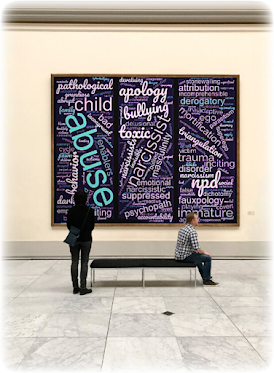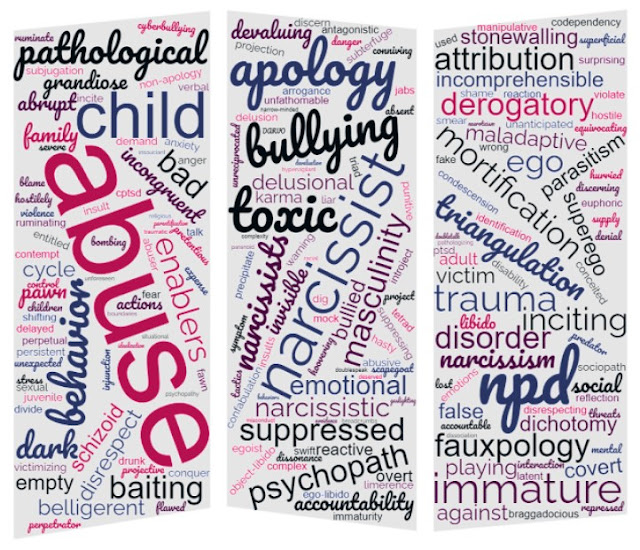
"A Pɪᴄᴛᴜʀᴇ ɪs Wᴏʀᴛʜ ᴀ Tʜᴏᴜsᴀɴᴅ Wᴏʀᴅs" "ᴀ Tʜᴏᴜsᴀɴᴅ Wᴏʀᴅs ᴀʀᴇ ᴡᴏʀᴛʜ ᴡᴀʏ ᴍᴏʀᴇ ᴛʜᴀɴ ᴛʜᴇ ᴘɪᴄᴛᴜʀᴇ."
~ Wᴏʀᴅs ᴀɴᴅ Tᴇʀᴍs Gʟᴏssᴀʀʏ Pᴀɢᴇs
~ Gloss.O.P.Q ~ Gloss.R.S ~ Gloss.T ~ Gloss.U.V.W.X.Y

O, is for,,
- OBJECT CONSTANCY =
- OBJECT LIBIDO =
- ONE SIDED STORIES =
- OPPRESSED = Subject to harsh and authoritarian treatment. Also: The state of being oppressed. The feeling of being heavily burdened, mentally or physically, by troubles, adverse conditions, anxiety, people, etc. Also: To be oppressed is to be exploited or systematically harmed by others. People who have no freedom are oppressed. Being oppressed is a negative and unfair condition. Also as simple as someone stopping you from saying anything, stopping you from doing anything, stopping you from being you.
- NARCISSISTIC OPPRESSION = Narcissists do this to you, especially by aggressively interrupting you against what you want to say to them, so that you can't speak and that they can take over to stop you from saying it. They'll also tell you that this conversation is over, without you getting a word in edgewise about what you wanted to say to them. Also, narcissist have people walking on eggshells unable to say how they really feel in hopes not to upset the narcissist. It can be exhausting because they are incapable of taking responsibility for their own actions so they'll always blame their victims, accusing them of being the hurtful ones, then ratcheting up their acts of aggressive behavior and oppression. The narcissist believes that everyone around them is there for only one reason: to meet their needs, or at least agree with them all the time. There's no point in arguing with a Narcissist, because by default, this is what they do.
- OPPRESSION = Persecution, abuse, maltreatment, ill treatment, tyranny, despotism, enslavement, exploitation, cruelty, ruthlessness, harshness, brutality, injustice, hardship, misery, suffering, pain, anguish.
- OPPRESSING SOMEONE = To oppress people means to treat them cruelly, or to prevent them from having the same opportunities, freedom, and benefits as others. When you oppress someone, you use your authority to keep them down. If you oppress people long enough, they might decide to fight back and then decide to oppress YOU. There is a saying that "power corrupts," meaning that once someone gains power, they tend to misuse it in self-serving or brutal ways.
- OSTRACIZE = exclude (someone) from a society or group.
"a group of people who have been ridiculed, ostracized, and persecuted for centuries" - OSTRACISM PSYCHOLOGY = Being ignored, excluded, and/or rejected signals a threat for which reflexive detection in the form of pain and distress is adaptive for survival.
- OSTRACIZED = Exclude, shun, cold-shoulder, reject, boycott, blacklist, cast out, shut out, avoid, ignore, exile, expel.
- OVERCARE = When our initial feelings of care about something or someone turn into obsessive worry, anxiety, or projecting the worst—this usually escalates into emotional depletion and the obvious stress load that follows. Can caring too much hurt your mental health? Yes, it's called compassion fatigue, and mental health experts say it's a phenomenon that occurs most commonly in people who work in professions like caretaking or who spend most of their time physically or emotionally taking care of another person.However I believe the good parents out there, also experience compassion fatigue this way as well.
P, is for,,
- PARASITISM =
- PARENTIFICATION =
- PATHOLOGICAL =
- PATHOLOGICAL BEHAVIOR =
- PATHOLOGICAL DEMAND AVOIDANCE =
- PATHOLOGICAL GRANDIOSE SELF =
- PATHOLOGICAL LIAR =
- PATHOLOGICAL PERSON =
- PATHOLOGIZING = Regard or treat (someone or something) as psychologically abnormal or unhealthy. Pathologizing, a term used to describe the process of labeling behaviors or emotions as abnormal or pathological, can significantly impact one's mental health. Being constantly told that one's thoughts or feelings are abnormal can lead to shame, isolation, or self-hatred.
- PAWN = Don't want to be someone's pawn.
- PEOPLE PLEASING PERSON = A people-pleaser is a person who puts others needs ahead of their own. This type of person is highly attuned to others and often seen as agreeable, helpful, and kind, but people-pleasers can also have trouble advocating for themselves, which can lead to a harmful pattern of self-sacrifice or self-neglect. It can be tied to a fear of abandonment, caused by relational trauma from childhood or youth that severed the person's trust in relationships. At some point in their life, they learned that having boundaries, asserting their needs, and showing their true colors would lead to blame, shame, judgment, or separation.
- PERPETRATOR =
- PERSPECTIVE ABILITIES =
- PHILOSOPHY =
- PREDATOR =
- PRETENTIOUS =
- PROFESSOR SAM VAKNIN = Professor of psychology; leading expert on narcissism.
- PROJECT =
- PROJECT ON TO SOMEONE =
- PROJECTIVE IDENTIFICATION =
- PROJECTIVE SPLITTING =
- PSYCHOLOGICAL PROJECTION =
- SELF PROJECTION =
- PSYCHOPATH =
- SOCIOPATH AND A PSYCHOPATH = Sociopaths tend to act more impulsively and erratically compared to psychopaths. Sociopaths generally struggle to maintain a job or a family life, whereas psychopaths may be able to do so. While psychopaths generally struggle to form attachments, sociopaths may be able to do so with a like-minded individual. If there's someone with sociopathy in your life, you might also notice other things that are off: maybe they don't fit right in social settings, or they have difficulty holding a job. People with psychopathy, though, are the opposite. They tend to be very successful and well-liked.
- PSYCHOPATH OR NARCISSIST =
- PSYCHOPATHY = Brain Sickness, derangement, insaneness, insanity, lunacy, madness, mental disorder, mental illness. Power corrupts, but in the absence of checks and balances, it also incubates psychopathy. Psychopathy is a neuropsychiatric disorder marked by deficient emotional responses, lack of empathy, and poor behavioral controls, commonly resulting in persistent antisocial deviance and criminal behavior.
- PUNITIVE THOUGHTS =
Q, is for,,
- QUID QUO PRO =
- NARCISSIST QUIZ ONLINE = Are you actually a narcissist, or do you even want to know? Take the quiz or test if you have the time, and find out.
- NARCISSIST OR EMPATH QUIZ ONLINE = Both an empath and narcissist are very sensitive individuals but in different ways. Empaths may internalize what other people are going through, blaming themselves for being unable to make others feel better. And on the other hand, narcissists tend to intensely dislike criticism or feelings of inadequacy.

~ WORDS AND TERMS GLOSSARY PAGES

- FYI: Last Words: Did you know?
 A recent meta-analysis of 437 studies found a strong relationship between narcissism and violence, where narcissistic individuals are more likely to commit acts of violence than their non-narcissistic counterparts. In order to be considered a psychopath, many other psychopathic symptoms such as a lack of attachment to others, superficial charm, dishonesty, manipulativeness and reckless risk-taking come into play.
A recent meta-analysis of 437 studies found a strong relationship between narcissism and violence, where narcissistic individuals are more likely to commit acts of violence than their non-narcissistic counterparts. In order to be considered a psychopath, many other psychopathic symptoms such as a lack of attachment to others, superficial charm, dishonesty, manipulativeness and reckless risk-taking come into play. - It's certain that psychopathic narcissists exist
 and here's the kicker: If a person has psychopathic traits, then they tend to have narcissistic and Machiavellian traits too. People with these personalities can't sense other people's feelings or see the world from any perspective apart from their own. They don't have a sense of conscience or guilt to stop them behaving immorally.
and here's the kicker: If a person has psychopathic traits, then they tend to have narcissistic and Machiavellian traits too. People with these personalities can't sense other people's feelings or see the world from any perspective apart from their own. They don't have a sense of conscience or guilt to stop them behaving immorally.
No comments:
Post a Comment